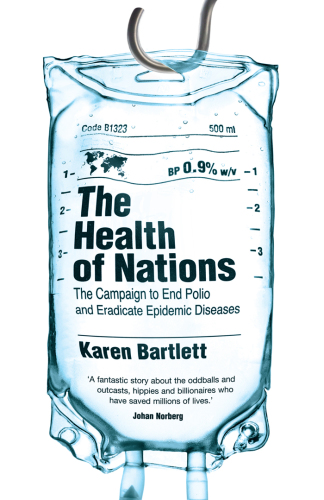
The Health of Nations
The Campaign to End Polio and Eradicate Epidemic Diseases
کمپین پایان دادن به فلجاطفال و ریشهکن کردن بیماریهای مسری
کتاب های مرتبط
- اطلاعات
- نقد و بررسی
- دیدگاه کاربران
نقد و بررسی

February 27, 2017
In this timely but bland account, British journalist and filmmaker Bartlett (Dusty: Lost Icon) chronicles several international campaigns to eradicate contagious diseases such as polio, smallpox, and Ebola. Focusing on the long, expensive, contentious fight against polio, Bartlett discusses the politics of immunization as well as the cultural and religious barriers to locating and immunizing the unvaccinated 2% of the world’s children. She tries to impart a sense of the hardships health professionals face, but her lackluster writing fails to bring her heroic subjects to life. Disease eradication, she argues, was a 20th-century dream. Now, religious intolerance and factionalism have put that dream at risk. While smallpox was eradicated in 1979, all other campaigns have “ended in failure.” Despite sustained efforts by international health organizations and wealthy philanthropists, world disease continues to plague the young and the impoverished; Bartlett points out that although tropical diseases account for 90% of the global disease burden, they receive about 10% of the research funds. She also covers battles to eliminate malaria, yellow fever, and Guinea worm, though they’re not considered contagious diseases. Readers who follow world news will find little here that’s surprising or heartening. Agent: Gaia Banks, Sheil Land Associates (U.K.).

March 1, 2017
Will the world ever be rid of infectious disease?London-based journalist, filmmaker, and author Bartlett (Dusty: An Intimate Portrait of a Musical Legend, 2014, etc.) reviews attempts to conquer infections from the days of Edward Jenner and the advent of the germ theory of disease to current efforts to eradicate polio. The book's structure is complicated and not chronological. The author begins with smallpox, explaining that the strategy leading to eradication called for "surveillance and containment." Rather than massive vaccinations of populations, the idea was to identify a case and then vaccinate all the persons who had been in contact with the patient. She follows with a detailed account of the development of the Salk and Sabin polio vaccines and the current global effort at eradication, often stalled due to war, falsehoods, and politics. Sadly, in the film Zero Dark Thirty, the Pakistani doctor who collected blood samples for DNA to verify Osama bin Laden's location for the CIA was wrongly identified as a polio vaccinator. That led to a Taliban ban on vaccination and the subsequent murders of polio vaccine volunteers. Bartlett also discusses the role of the Bill & Melinda Gates Foundation in the polio campaign and controversies in the global health community about how priorities should be set. Then she returns to history with a minireview of immunology science followed by chronicles of the wins and losses over the years in the battles against a variety of diseases. Bartlett also reviews in detail the long history of anti-vaccination campaigns, currently on the rise in America. The narrative can sometimes overwhelm with names, dates, places, bureaucratic agencies, and acronyms. Some individuals and programs are highly efficient and effective; some are hopelessly venal and corrupt. Still others, like the World Health Organization, she writes, are simply understaffed and underfunded. Bartlett makes it abundantly clear that research to reduce the impact of infectious disease is progressing but that politics, budgetary constraints, competing priorities, and ego clashes are serious impediments.
COPYRIGHT(2017) Kirkus Reviews, ALL RIGHTS RESERVED.

March 1, 2017
Smallpox, polio, measles, and malaria are a few of the diseases that cause devastation in many countries. Smallpox has been eradicated, but ridding the world of other viruses is not easy. Bartlett (with Eva Schloss, After Auschwitz: A Story of Heartbreak and Survival), a London-based journalist and former director of human rights group Charter88, takes readers on an epidemiological tour to see how public health professionals fight disease around the globe. From Edward Jenner's discovery that inoculating people with cowpox would prevent smallpox to the development of rival polio vaccines by Jonas Salk and Albert Sabin to efforts to contain outbreaks of Ebola and Zika, she looks at the obstacles posed by a lack of resources, government bureaucracies, and the difficulties of reaching isolated rural areas. She also covers the contributions of nonprofits and organizations such as the Gates Foundation. Anyone interested in public health and its interface with politics will find both hope and frustration here. VERDICT A fascinating look at epidemiology and the challenges that public health workers face.--Barbara Bibel, formerly Oakland P.L.
Copyright 2017 Library Journal, LLC Used with permission.

























دیدگاه کاربران